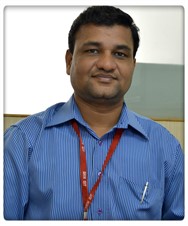|

Mr. Namdev.K. Gavade
M. E. (Mechanical)
H.O.D. Mechanical
|
Welcome to mechanical engineering department at SKN Sinhgad Institute of Technology and Science, Lonavala. Our goal for undergraduate and graduate students is to give them a high-quality engineering education that includes hands-on experience. Each of our faculty members is ready and willing to work in their specialty with capable students on individual projects. Our faculty has two major areas of research: thermal engineering and mechanical design engineering. Both areas strongly supports the growing automotive and manufacturing industries in the state and the region.
We strive to ensure that all our undergraduate students have a strong education with teaming and leadership skills, involvement in student activities, and the practical background of co-op and internship experience. We believe that emphasizing these areas will make our students well qualified to take leadership roles in the future.
Department Vision
We strives for excellence in technical education and research themes with an aim to become globally competitive department.
Department Mission
To serve all stakeholders through quality education and impart knowledge, attitude and skills to develop individuals and teams.
Department Objectives
- To create aesthetically sensitive, socially committed & technologically competent Engineering & Management professionals.
- To implement effective teaching learning process (T-L-P) so as to achieve excellent academic performance in the university examination.
- To build a personality equipped with exquisite technical and non-technical skills, which are globally at par.
- To introduce various Faculty DevelopmentPrograms (FDP) and providing them proper guidance related to the subjects by experts in Train the Trainerprogram (TTT).
Short Term Goals
- To maintain a high quality of mechanical engineering education finished with outstanding teaching, innovative curricula.
- To attract highly motivated students with interest in mechanical engineering.
- To track education with recent research and technology transfer.
- To create opportunities for continuous faculty developments of the Department.
Long Term Goals
- To provide best quality mechanical engineers according to changing needs of society.
- To recruit, retain faculty of the Department. To rise the public awareness about activities in the Mechanical Engineering profession.
- To establish a mechanism which will help to satisfy the current need of industry.
- To develop laboratories which can be used for material testing.
Department PEO, PO & PSO
Programme Educational Objectives (PEOs):
The students of Mechanical Engineering course after passing out will-
- To develop students to achieve high level of technical expertise with Strong theoretical background and sound practical knowledge.
- To inculcate research environment for enhancement of Academia – Industry collaboration through conference.
- To prepare graduates to be sensitive to ethical, societal and Environmental issues while engaging their professional duties, Entrepreneurship and leadership.
- To Enhance ability of students for providing Engineering solution in a global and societal context.
- Pursue higher education for professional development.
Programme Outcomes (POs):
The students in the Mechanial Engineering course will attain:
- Engineering knowledge: Apply the knowledge of mathematics, science, engineering fundamentals, and an engineering specialization to the solution of complex engineering problems.
- Problem analysis: Identify, formulate, review research literature, and analyze complex engineering problems reaching substantiated conclusions using first principles of mathematics, natural sciences, and engineering sciences.
- Design/development of solutions: Design solutions for complex engineering problems and design system components or processes that meet the specified needs with appropriate consideration for the public health and safety, and the cultural, societal, and environmental considerations.
- Conduct investigations of complex problems: Use research-based knowledge and research methods including design of experiments, analysis and interpretation of data, and synthesis of the information to provide valid conclusions.
- Modern tool usage: Create, select, and apply appropriate techniques, resources, and modern engineering and IT tools including prediction and modeling to complex engineering activities with an understanding of the limitations.
- The engineer and society: Apply reasoning informed by the contextual knowledge to assess societal, health, safety, legal and cultural issues and the consequent responsibilities relevant to the professional engineering practice.
- Environment and sustainability: Understand the impact of the professional engineering solutions in societal and environmental contexts, and demonstrate the knowledge of, and need for sustainable development.
- Ethics: Apply ethical principles and commit to professional ethics and responsibilities and norms of the engineering practice.
- Individual and team work: Function effectively as an individual, and as a member or leader in diverse teams, and in multidisciplinary settings.
- Communication: Communicate effectively on complex engineering activities with the engineering community and with society at large, such as, being able to comprehend and write effective reports and design documentation, make effective presentations, and give and receive clear instructions.
- Project management and finance: Demonstrate knowledge and understanding of the engineering and management principles and apply these to one‟s own work, as a member and leader in a team, to manage projects and in multidisciplinary environments.
- Life-long learning: Recognize the need for, and have the preparation and ability to engage in independent and life-long learning in the broadest context of technological change.
Program Specific Outcomes(PSO):
A graduate of the Mechanical Engineering Program will demonstrate-:
- Recognize, formulate and analyze Real life Mechanical engineering problems through different skill set.
- Apply the acquired Mechanical Engineering knowledge for entrepreneur and to the advancement of society.

